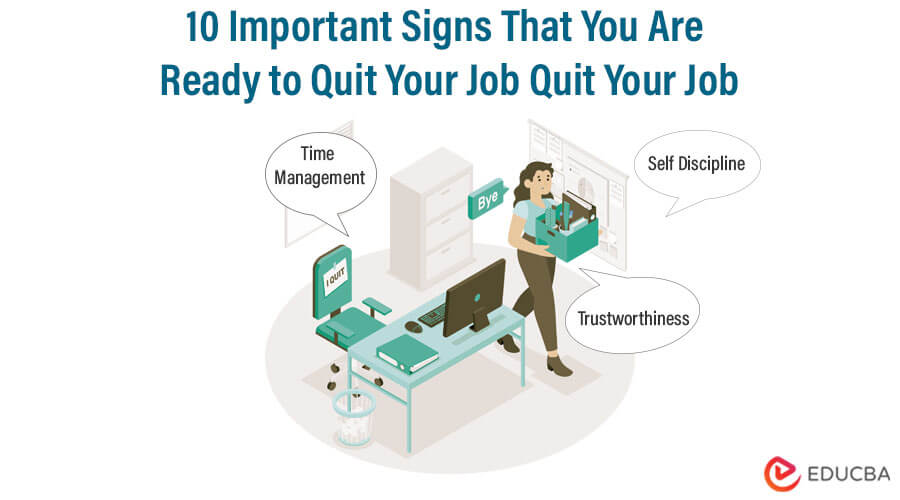Updated May 31, 2023
Quit Your Job
These are ‘Signs’ or indications to start looking for a new job. The time for seeking a new job is here. Although every employee has to face a few highly stressed or discouraging days in the office or at the workplace, it’s time to seek a new job if the feeling prolongs of being overworked and distressed. Every job position has a fixed life span, and it never relies on which stage of your career you are in. This life span varies depending upon the work circumstances and you as an individual employee. So, once you attain the last point of the ride, it’s the right time to look for something new and fresh to boost your career. This step will help avoid any barrier or stagnation in quitting your job career.
Indications of Being Stressed Out
Just like most of us, you are hyperactive and energetic when you join any organization. As you reach the 4th or 5th year of your career, your performance starts dipping, and you lose the flame. The passion has disappeared from the job and workplace, and you finally want to quit.
This very strong feeling pushes you to quit your current job and look for a new one. The spark to perform has subsided; the reason is unknown – why this happened. There could be various reasons such as hating the new boss, feeling exhausted by incompetent team members, receiving a better job opportunity, or having new plans for one’s life. This feeling indicates that you are completely stressed out and want to quit. But this feeling should never be ignored. Rather find out why you want to leave and say goodbye to the current organization.
Quitting is a good thing when the time and reasons are right. Most folks hesitate to leave because of fear of losing or the stigma of giving up.
But remember that there’s also an upside to quitting: the faster you make the right decision to move out, the lesser opportunity cost you incur for joining a new company that fits you well and one that can truly set you up for success.
10 Good Reasons to Quit Your Job
This guide will help you determine whether this distraction is short-term or the right time to take a leap and say a final goodbye to your company. Firstly, you need to differentiate whether it is just a bad day or you direly need a change in your job. How will you judge whether it’s time to leave? Once you decide to move on, you should take the necessary steps. Start by analyzing and learning the 10 signs indicating that you are ready for that plunge.
#1 Quit your job- You dislike your peers or your boss
The human being is a social animal. It’s necessary to have a team in which you can work coercively. Supposedly, you have been working in this organization for a year and need to get along with the people you work with or report to. Neither do you like them, nor do they. However, you have friends or a social group outside the organization. It’s time that you quit your job and join somewhere else.
The maximum number of employees quit their bosses and not their jobs. Research published by Gallup Poll in 2011 shows that 80% of employees leave their jobs because they can’t manage their relationship with their boss and not the demands of their career.
#2 Quit your job- Your company is sinking
The people working for the company know the real situation of the company. If you can assess that the company would not be able to pay you any longer or gauge that there aren’t any bonuses given out because of no profits, it should be understood that the company is going through a low phase. The company will not be able to make it in the long run. If this continues for the next month or quarter, you will seek a new job.
#3 Quit your job- Consistent stress, negativity or anxiety
No job is worth your health. Job stress can lead to heart disease and depression and further to Failure. Some days at work are bound to be better than others, but an employee who has been in an organization for the last 4-5 years, suddenly gets the impression that each new day on the job is a little worse than the one before it, this might be the quitting time. Such a feeling will create more negativity, making you anxious and leading to mental stress and inefficiency. So it’s better to decide to quit rather than face consistent pressure.
#4 Quit your job – You or your work is not being acknowledged anymore
It is necessary to praise everyone for the efforts they put in. If not appreciated, the sense of motivation starts reducing. If no one is hearing or valuing your ideas anymore. you can’t seem to get time with the ‘authorities’ or ‘superiors’; or you cannot get approvals or acknowledgment for great work, think about finding a new job.
#5 Quit your job- No work-life balance
“All work and no play makes Jack a dull boy”. Work-life balance is a true concern for everyone. If you’ve been spending less time with your family because you have to pay 80-85 hours a week at work, you should look for employment that will let you have a better balance between work and life.
Spending time with yourself is very important as it helps you analyze your inner self and thus gives you time to work on them. If you’re working so many late nights you don’t feel like a person anymore, leave your job and find one that allows you to have time for yourself. What’s the point of making a living if you don’t have time to live?
#6 Your Gut-feeling asks you to Quit Your Job
Beyond these warning signs, don’t ignore what your gut is telling you. Nobody knows about your work environment better than you do. And if you feel that you are better off somewhere else, listen to that inner voice and go ahead. Don’t say aloud, “I need a new job, now!” if you’ve already been pondering over the thought of leaving your job, possibilities are that it is happening for a good reason. Tomorrow should come with the promise to be different, in a good way, from what it is today. Every job should lead to something good: a promotion, but if not, the opportunity to take on more responsibilities, learn better things, tackle new challenges, find new ways to earn incentives, etc.
#7 No salary-hike, despite of the increase in duties and responsibilities
If the economy and business are both doing well, and you’ve been exceeding your targets but need to reflect your salary or other rewards, there is something wrong. If you’re not growing or learning anything new, it might be time to look for a company that will value you more and leaves the current one, Sutton Fell says.
You see that you have been assigned more duties and responsibilities and have become a major part of the decision-making process; it’ll boost your morale. However, if this role comes without any raise or hike in the salary, there is no fun. You’ll not be able to give your hundred percent further, and if there is no hope for any hike, it’s time to look for a better salary with the current role and responsibilities.
#8 Quit your job- Monotonous job with no purpose
You’ve stopped enjoying your job. Many of us do the same routine job day in and day out, which makes our life boring and monotonous. If you’re so bored by your job that it’s affecting your quality of work, it’s time to consider changing jobs. Refrain from thinking of what changes when you drag yourself to work in the morning and it’s time to leave your job.
When you’ve grown as a professional, and now you’re stagnating in your company, you should go ahead and ask for a change of position or look for opportunities — otherwise, you’re simply curbing your potential.
#9 Quit your job – Better Offer
This is the best and clearest reason to quit your current job. You should quit and take the offer if you get a job offer that:
- pays better,
- presents a better position,
- has more reasonable hours,
- is more stable,
- lets you enjoy a good work/life balance or/and
- takes care of issues you may have with your current job.
But judging a “better” opportunity isn’t as easy as it might look. Langerud said you could consider if something is a better opportunity (and a viable reason to quit) by whether or not the new position “feels like home or fills a deeper need“. Harris says the best reason to leave your job is when it’s a strategic move that advances your career. Whether this means a higher level of responsibility, location change, or even a lesser salary sometimes, it could be a good indicator to try something different from your regular job.
#10 Quit your job – No growth opportunities
Getting stuck in a job can be easy, and if one loves what their job offers, it can provide a sense of comfort. However, every job must help you enhance your skills and adds to your value as an employee. If there is nothing new to learn and you are just wandering here and there doing the same old routine while people around you get promotions and wonderful opportunities, it’s time to look elsewhere.
If you are still looking for a promotion at your current organization that better uses your potential, start searching for a position in another company where you can utilize your talent and skills. “No one has said anything; however, you are no longer getting the plum assignments, you are no longer asked to attend key meetings, or your proposals are met with silence or denial,” Hockett adds. You are unchallenged, need more responsibility, and seek opportunities outside your current organization. You’ve explored the current and potential options, and they are constrained. You do not see any chance of growth anymore. “These are signs that you should seek a new job.”
Every job has its ups and downs. You may go through difficult times now and then. However, experiencing more lows than highs indicates it’s time to start looking for better options.
Once you realize it might be time to leave your job, set goals for yourself and analyze your expectations regarding responsibilities, work culture, remunerations, perks, benefits, etc. Kahn says, “Create timelines for yourself of finding another opportunity and making your exit.”
Staying in a bad job for too long can harm you. Every possible effort to improve things goes in vain; stop trying and move on to a new position and environment. If you have already decided to leave, be smart about it. Don’t burn bridges by venting about all the reasons you’re leaving. That gives nothing and could even work negatively for you later. It’s always better to leave on a positive note. Remember, your last employer is the first source of contact (while referencing).
If any or all of the above strike a chord with you – then it’s the right time for you to make some important decisions because continuing in this way will harm you emotionally and psychologically, which in turn, will adversely affect your family life. Although you might feel it, you may not see that you are also experiencing setbacks and failure. The individual fails to experience happiness, satisfaction, and contentment, and they neglect to observe the world outside of their workplace.






